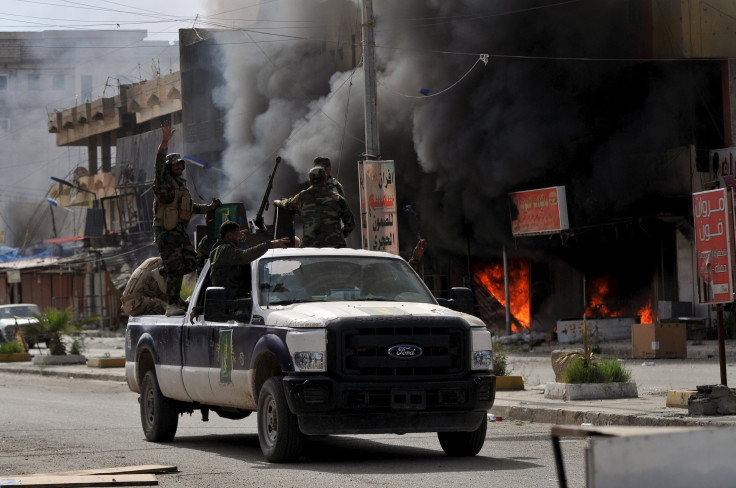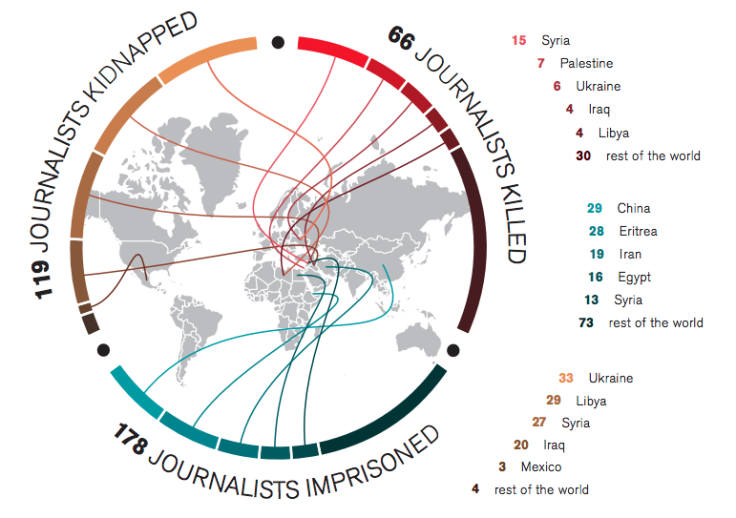Death Threats Over Tikrit Coverage Force Reuters' Baghdad Bureau Chief To Flee Iraq; Latest Sign Violence Against Journalists Is Rising

Ned Parker, the Baghdad bureau chief for Reuters, has left Iraq after receiving threats on Facebook and a satellite news channel run by a Shiite paramilitary group, the news agency reported Saturday. The threats began last week after Parker and two colleagues reported on lynchings and looting in the city of Tikrit.
Parker's exit is the latest signal that violence against journalists is rising in Iraq and around the world. Last year, 118 journalists and media staff were killed while on duty, an increase of 13 deaths compared with 2013, the International Federation of Journalists reported in December. The organization cited wars and conflicts in Iraq, Syria and Ukraine as well as violent insurgencies in Pakistan and Afghanistan for the increase in journalist deaths.
Pressure on Parker mounted after an April 3 Reuters investigation on human-rights abuses in Tikrit after Iraqi government forces and Iranian-backed militias expelled the Islamic State group, formerly called ISIL or ISIS. Two Reuters journalists in the city saw Iraqi police lynching an Islamic State group fighter. The team also witnessed widespread looting and arson, acts that local politicians blamed on the Iranian-backed militia.
Soon after the story was published, an Iraqi Facebook page that is believed to be linked to armed Shiite groups began issuing threats against Parker, Reuters said. An April 5 post and related comments demanded the journalist be expelled from Iraq. One commenter suggested that rather than force his exit, killing Parker was "the best way to silence him."
Three days later, a TV station owned by Asaib Ahl al-Haq, an Iranian-backed armed group, broadcast a segment on Parker accusing him and Reuters of denigrating Iraq and its forces. The segment, which showed Parker's photo, called on viewers to demand he be expelled.
Rafid Jaboori, a spokesman for Prime Minister Haidar al-Abadi, a moderate Shiite, said the Iraqi government was "definitely against any message that encourages hatred or intimidation, whether it comes from a local or international network," Reuters reported.
Michael Lavallee, a U.S. State Department spokesman, condemned the threats against Parker and told Reuters the agency had spoken with Abadi's office "to raise our concerns about the potentially dangerous atmosphere created by an editorial broadcast on a private Iraqi television network about the Reuters bureau chief and the Reuters staff in Iraq."
The State Department "will continue to closely monitor the treatment of international media in Iraq and raise objection to any form of intimidation that may inhibit the ability of the media to perform their work," Lavallee said.
The Committee to Protect Journalists, a media advocacy group, said at least 15 journalists have been killed in Iraq since the beginning of 2013, though no deaths have been reported in the country so far this year.
Worldwide, 22 journalists have been killed on the job in 2015, including five people in South Sudan and eight people in Paris in connection with the January terror attack on the French magazine Charlie Hebdo, according to the committee.
Other attacks against journalists are also on the rise, including kidnappings, imprisonment and arrests. About 160 professional and citizen journalists were forced to flee their country last year as a result of their work -- more than double the number in 2013, Reporters Without Borders said in its annual round-up of abuses.
About 120 reporters were abducted on the job last year, or 37 percent more people than in the previous year. Twenty people were held hostage in Iraq, while about 30 people each were taken in Ukraine, Libya and Syria. Around 180 journalists were imprisoned last year, mainly in China, Eritrea, Iran and Egypt, roughly the same as the year before.
The France-based organization gave a lower count for journalists who were murdered last year, putting the total at 66, compared to the 118 people estimated by the International Federation of Journalists.
Reporters Without Borders issued a stark warning for journalists in its December roundup. "The murders are becoming more and more barbaric and the number of abductions is growing rapidly, with those carrying them out seeking to prevent independent news coverage and deter scrutiny by the outside world," the non-profit wrote. The roundup "highlights an evolution in the nature of violence against journalists and the way certain kinds, including carefully-staged threats and beheadings, are being used for very clear purposes."

© Copyright IBTimes 2024. All rights reserved.





















